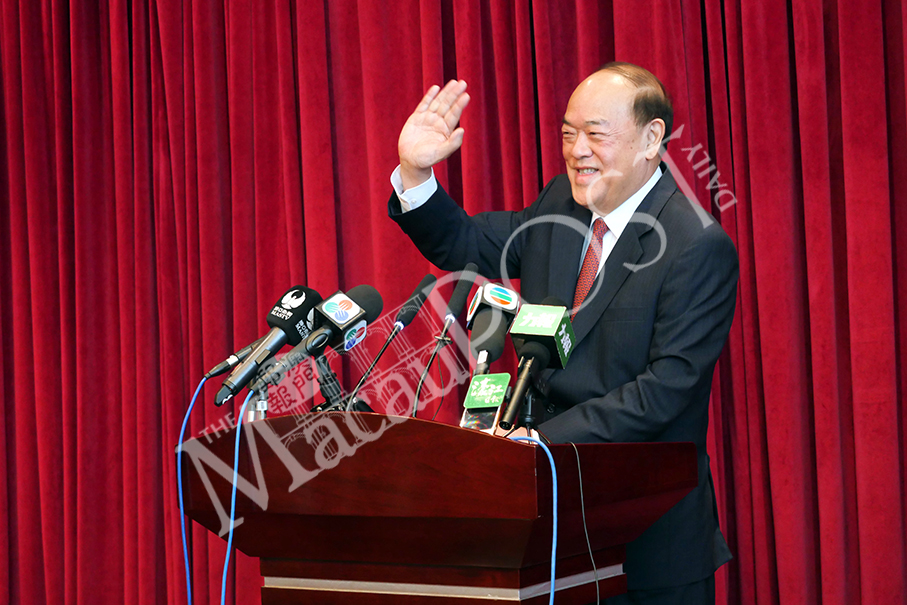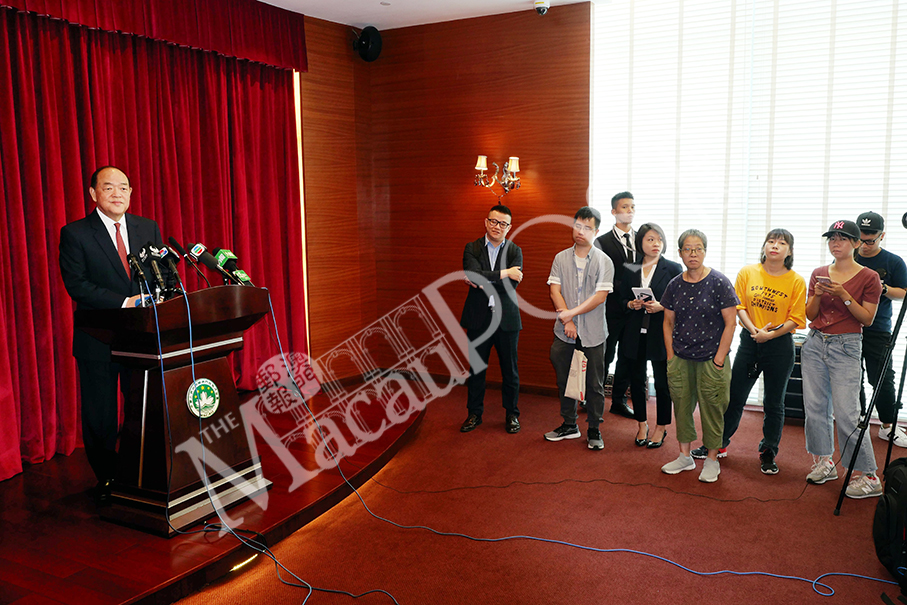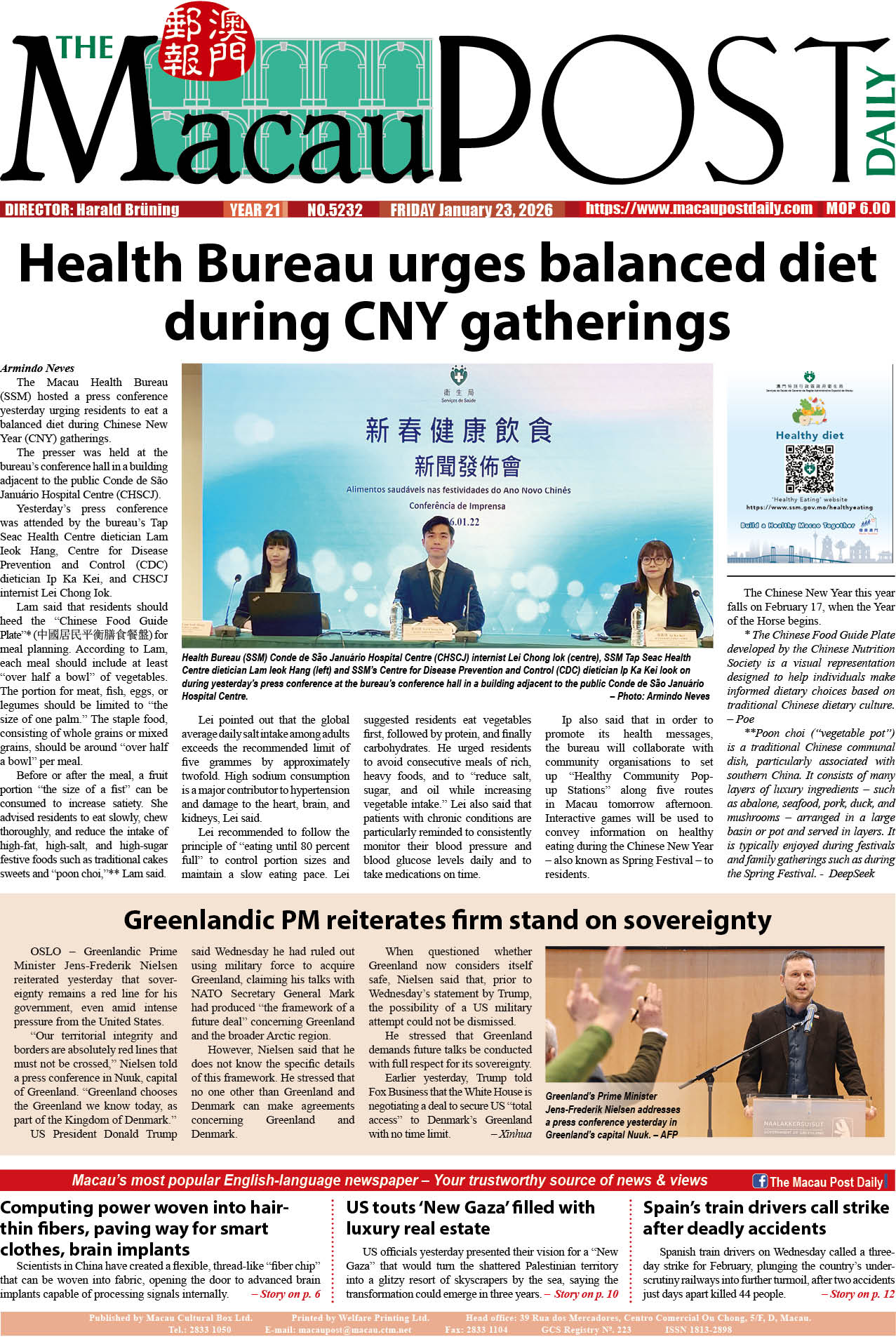Chief Executive-designate Ho Iat Seng said yesterday that he was still listening to opinions from civil society about his selection of the government’s five policy secretaries in his upcoming administration.
Ho, 62, spoke to reporters at the local airport yesterday morning before departing for a three-day working trip to Beijing where he will receive a State Council decree today designating him as the fifth-term chief executive of the Macau Special Administrative Region (MSAR).
Ho said that he would only know the formal schedule of his visit after arriving in Beijing. Ho said he believed that the central government will arrange his visit in a way similar to the “usual previous practice” so that, according to Ho, he is slated to meet President Xi Jinping after receiving his appointment decree from Premier Li Keqiang, who signed the decree – officially known as State Council Decree No. 719 – when chairing the 3rd plenary session of the State Council last Wednesday.
After his re-election in August 2014, Chief Executive Fernando Chui Sai On received his State Council decree from Li at the Zhongnanhai leadership compound on September 22, 2014 designating him as the fourth-term chief executive, after which Xi met Chui at the Great Hall of the People later the same day.
Ho also said that before returning to Macau, he would present a roundup of his visit on the last day of his trip – tomorrow – to the reporters covering his visit.
Ho said that during his meeting with Xi, he would present the future work plan for his incoming administration, adding that he would talk about his ideas of governance and the contents of his election campaign platform.Ho also said that he believed that Xi has a “very” good understanding of Macau’s situation. Ho said he believed that Xi would pay close attention to his future governance. Ho said that his meeting with Xi would include a discussion on “what tasks I should do first with the aim of maintaining residents’ confidence in the new government.”
Housing major focus
Ho said that the housing issue would be the major emphasis of his administration, followed by traffic issues, adding that his future government would study how to effectively improve the city’s traffic situation after the future publication of Macau’s official urban master plan. Ho said that his government would tackle the housing issue first, such as getting public housing projects on the land reclamation area known as Zone A to off the ground as soon as possible.
When asked by a reporter what his “mood” was like concerning his trip to receive his appointment decree, Ho said that he was in a “normal and stable” mood.
When asked whether he would discuss his selection of policy secretaries for his administration with central government officials during the three-day visit, Ho noted that it is early September now so he still has sufficient time to consider his selection of policy secretaries. Ho said that he still has not come up with his selection of policy secretaries for the central government to consider.
The Macau government has five policy secretaries.
Ho said that after listening to opinions from various segments of civil society and finally deciding on his final choice of policy secretaries, he would send the list to the central government.
According to Article 50 of the Macau Basic Law, Macau’s principal officials comprise the government’s policy secretaries, anti-graft commissioner, audit commissioner, head of the Unitary Police Service (SPU) and chief of the Macau Customs Service.
According to Article 50 of the Macau Basic Law, the chief executive “nominates and reports to the central government for the appointment” of the nine principal officials and the chief prosecutor, and recommends to the central government the removal of the 10 officials.
According to Section 4 of Chapter 4 of the Macau Basic Law, Macau’s Public Prosecution Office is part of the Judiciary, not the executive branch of the government.
Ho insisted that the central government would not give him any instructions on choosing the 10 officials, as the matter was covered by Macau’s high degree of autonomy. However, Ho noted that as the 10 officials – the nine principal officials and the chief prosecutor – are to be appointed by the central government, there was always a need for the two sides – Macau’s chief executive and the central government – to communicate with each other on the matter.
Ho said that based on the official procedures, he would have to report the list of the 10 officials to the central government late next month or early November.HK issue won’t be raised
When asked whether he would discuss the current Hong Kong situation with the central government, Ho said that state leaders have a “very” good understanding of Macau and Hong Kong’s situation so that he would not need to raise the issue with them. Ho also said that as Macau’s chief executive-designate, he would only discuss Macau matters with the central government, adding he believed that the Hong Kong government is capable of solving the city’s issues.
Ho also said that he started to work in the Chief Executive-designate Office on Monday – an office for transition matters between the current government and his future administration.
‘As white as a piece of paper’
‘Ho underlined that concerning his selection of policy secretaries, he has not spoken to any of the current policy secretaries, or any residents he might plan to choose as new policy secretaries in his administration. Ho said he was still listening to the various opinions raised by different segments of civil society on the matter. Ho said that some have suggested that he should choose those who are “as white [in terms of clean governance] as a piece of paper.” Ho said it was very difficult for him to get such a kind of candidate, as civil society might consider a person “as white as a piece of paper” as lacking experience. Ho said that he really would be unable find anyone as white as a piece of paper in civil society unless he was looking at fresh university graduates.
3 criteria for policy secretaries, plus loving the country & Macau
Ho reiterated the three main criteria – which he had previously mentioned – that the five policy secretaries of his future administration must possess, namely integrity, executive capabilities, and the willingness to communicate with residents.
Ho said that integrity was the minimum moral standard that a person must have. Ho said that executive capabilities included whether a policy secretary is able to supervise bureau directors under him or her. Ho said that if a policy secretary formulates some particular policies without listening to residents’ opinions, he or she would then be unable to get the policies off the ground as residents would strongly oppose them.
Ho also said that “loving the country and loving Macau is a must [for a policy secretary] so that I don’t need to mention it”, adding that “I will definitely not hire those who do not love the country and Macau”. Ho said he hoped to find those loving the country and loving Macau who meet all the three criteria as the policy secretaries of his future government.
Changing policy secretaries’ powers
Ho said that based on his work experience in the legislature – which he joined in 2009, he believed that all the current and former policy secretaries were striving to do their best. Ho said that the difficulties that policy secretaries have been facing in carrying out their tasks were due to institutional problems. Ho noted that Macau’s public administration system originates from the one in Portugal and that it has remained unchanged for 30 years. Ho noted that in such a system, policy secretaries do not have the sufficient powers required and their responsibilities are not clearly defined. Ho said that therefore one major item on his election platform was to reform the public administration, such as making changes to the powers and responsibilities of the government’s five policy secretaries.
Ho reiterated that his future public administration reform drive would not only focus on streamlining procedures and limiting the number of public servants, but also on “devolving more powers” to lower level entities and officials.
Ho, a former speaker of the Legislative Assembly (AL), will be sworn as Macau’s third chief executive – and fifth-term chief executive – on December 20 – the 20th anniversary of Macau’s return to the motherland.
The veteran businessman, civic leader and lawmaker will be Macau’s third chief executive, succeeding Fernando Chui Sai On and Edmund Ho Hau Wah. Since both Chui and Edmund Ho were elected to serve two five-year terms, Ho Iat Seng will be Macau’s fifth-term chief executive. His late father Ho Tin was a legendary manufacturing pioneer in Macau. His sister Ho Teng Iat is an entrepreneur and former lawmaker. She runs the family’s business interests.

Chief Executive-designate Ho Iat Seng waves to media workers at the end of yesterday’s press briefing at the airport before departing for a three-day visit to the nation’s capital where he will receive his appointment decree from Premier Li Keqiang today. Photo: Iong Tat Choi

Local reporters attend yesterday’s Q&A session by Chief Executive-designate Ho Iat Seng (left) at a pressroom of the airport. The press briefing lasted about 25 minutes. Photo: Iong Tat Choi





